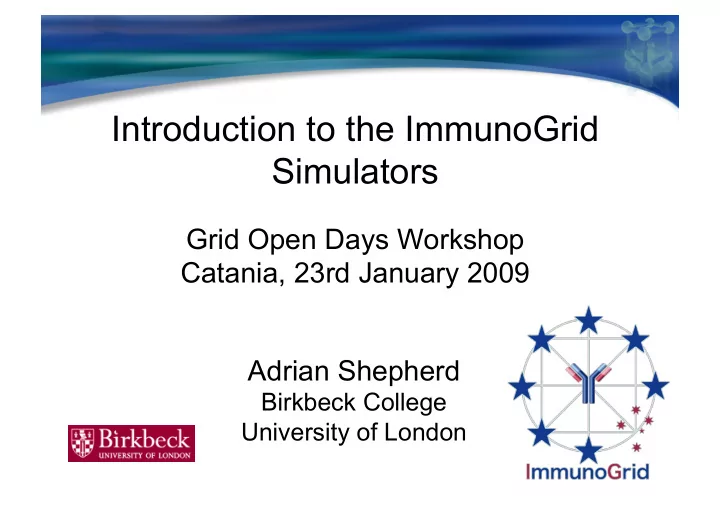

Introduction to the ImmunoGrid Simulators Grid Open Days Workshop Catania, 23rd January 2009 Adrian Shepherd Birkbeck College University of London
Innate and Adaptive Immunity
Immune System Cell Types Immune System Cell Types
Inside the Cell… Transport, cleavage, presentation, recognition Inside the Cell...
Phases of Adaptive Immunity
Maturation of B and T Cells Maturation of B and T Cells
The Challenge of Complexity • Multi-level (from molecules to organs) • Temporal (seconds to years) • Spatial (signalling and diffusion) Immune System Characteristics • Diversity (molecules, cells, individuals) Key modelling issue: Complexity versus simplification
Cellular Automata Conway’s Game of Life (1970) Cellular Automata Emergence of complex, unpredictable “behaviour” from simple rules
Characteristics of CAs • Simple, local rules • Emergent behaviour Cellular Automata Characteristics Contrast to differential equations: – Individual agents , not average behaviour (enables us to model the life-history of individual cells) – Stochastic (potentially model the distribution of behaviours within a population) – Understandable – Easily extensible
The C-IMMSIM 2D Lattice Agent based model: set of biological agents (cells and molecules) at a given location on lattice interacting probabilistically MHCII B IL-12 T DC Abs TCR MHCI +Pep Ag Tumor M ϕ cell In practice a hexagonal or triangular lattice is often used.
The ImmunoGrid Simulators Lattice-gas cellular automata of increasing complexity B Th The ImmunGrid Simulators CTL MA DC Ag
Modelling Lymph Nodes Towards Models of Lymph Nodes Lymph channel Lymph node Lymph node
Computational Requirements To run complex single simulations (large cluster or supercomputer) To run large sets of simulations (explore parameter space, investigate clinical scenarios for multiple individuals) To support smaller-scale simulations (e.g. educational simulations using standard workstations)
Why Developed Our Own Grid Solution? Long-term access to national /international production-quality Grids not guaranteed Consortium partners can contribute own local resources (though no single partner has sufficient resources for whole project) We believe simple “home-made” Grid now both feasible and effective solution Provides us with the control and flexibility we desire
Our Grid Implementation Web Interface Job launcher AHE Client VM-Ware DESHL Glite Virtual UI AHE Server UNICORE JSDL JSDL JSDL JDL GridSAM GridSAM GridSAM GATEWAY GATEWAY Web Service FORK RSL NJS PI2S2 Local NGS Local DEISA CINECA Resource Cluster GLOBUS RSL - Resource Specification Language JSDL - Job Submission Description Language NJS - Network Job Supervisor JDL – Job Description Language
The Triplex Vaccine Allo-MHC (H-2 q ) IL-12 p185 neu genes IL-12 HER-2/neu transgenic mouse mammary carcinoma
Vaccination Schedules
Schedules and Tumor Progression
Schedules and Tumor Progression
Schedules and Tumour Progression Summary of experimental evidence
Simulation Reproducing results of in vivo experiments SimTriplex vaccine in virtual mice
Acknowledgements Elsewhere Birkbeck Vladimir Brusic (scientific coordination: David Moss formerly U of Queensland, now Dana-Farber) Mark Halling- Elda Rossi (CINECA) Brown Filippo Castiglione (CNR) Claire Sansom Santo Motta (U of Catania) Masters and Pierre-Luigi Lollini (U of Bologna) PhD students Marie-Paule Lefranc (IMGT, CNRS) Søren Brunak, Ole Lund (DTU)
Recommend
More recommend